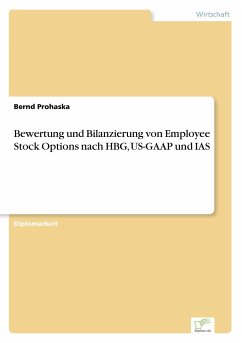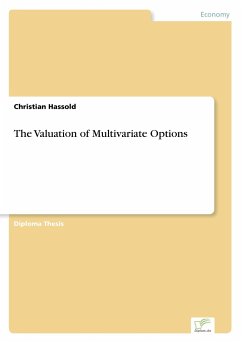Master's Thesis from the year 2003 in the subject Business economics - Investment and Finance, grade: 1,0, Tilburg University (Economics and Business Administration), language: English, abstract: Inhaltsangabe:Abstract:
Companies located all around the world increasingly utilize stock options as a means of compensation for employees. Despite their widespread use it is still unknown why employee stock option plans are adopted, how their effectiveness is defined, and what influences their effectiveness. This master s thesis reports on an exploratory study undertaken on a sample of employees of the German IT company Network Appliance GmbH intended to answer exactly these questions.
The aim of this study was to explore in an in-depth, descriptive fashion, the perspectives of employees receiving stock options as part of their compensation as they are as participants in the process - best situated to provide insights into the practical implications on the use and effectiveness of employee stock options. The qualitative methodology of the study allowed for the opinions and experiences of the employees to be heard and a rich picture of their perceptions on employee stock options was attained. The qualitative content analysis revealed a number of goals, which are associated with employees perceptions on why employee stock options are a part of their compensation, and which factors influence these goals effectiveness. An exploratory model of the use and effectiveness of employee stock options has been deducted from these findings, which enables managers and researchers to obtain a better understanding of this means of compensation.
Even though research on compensation structures is typically explained by agency theory, the findings of this thesis suggest that no single theory provides a comprehensive explanation of the use and effectiveness of ESOs. Although the existence of a gap between employee and shareholder interests may lead some companies to adopt an employee stock option plan as suggested by agency theory, it is unlikely to be the only reason. Reality seems to be more complex than anticipated by guiding theory in this stream of research, therefore this study suggests that several theoretical frameworks complementing each other, such as human resource management, social exchange, tournament, social comparison, expectancy, managerial discretion, an institutional theory, are needed to fully grasp the use and effectiveness of employee stock options.
Inhaltsverzeichnis:Table of Contents:
Management SummaryII
ReferencesIII
Table of ContentsVIII
1.Introduction1
1.1Introduction1
1.2Problem indication1
1.3Problem2
1.4Research questions2
1.5Structure of the thesis3
2.Employee stock options4
2.1Introduction4
2.2What are employee stock options?4
2.3Types of ESOs5
2.4Origins of ESOs6
2.5ESOs in international markets7
2.6ESOs in the German market9
2.7The fiscal situation for ESOs in Germany9
2.7.1Taxation of the employee10
2.7.2Tax deduction in the company10
2.8Case study Network Appliance11
2.8.1ESOs at Network Appliance GmbH12
2.8.2Outline of the stock option plan12
2.9Conclusion13
3.Theories explaining the use of ESOs15
3.1Introduction15
3.2Agency theory as the traditional explanation15
3.2.1The two typical agency problems16
3.2.2Agency theory and ESOs17
3.3Non-traditional explanations18
3.3.1Human resource management theory18
3.3.2Social exchange theory19
3.3.3Tournament theory20
3.3.4Social comparison theory21
3.3.5Expectancy / Managerial discretion theory22
3.3.6Institutional theory23
3.4Conclusion23
4.Research design25
4.1Introduction25
4.2Research method25
4.3Sample of participants26
4.4Data collection26
4.5Operationalizati...
Hinweis: Dieser Artikel kann nur an eine deutsche Lieferadresse ausgeliefert werden.
Companies located all around the world increasingly utilize stock options as a means of compensation for employees. Despite their widespread use it is still unknown why employee stock option plans are adopted, how their effectiveness is defined, and what influences their effectiveness. This master s thesis reports on an exploratory study undertaken on a sample of employees of the German IT company Network Appliance GmbH intended to answer exactly these questions.
The aim of this study was to explore in an in-depth, descriptive fashion, the perspectives of employees receiving stock options as part of their compensation as they are as participants in the process - best situated to provide insights into the practical implications on the use and effectiveness of employee stock options. The qualitative methodology of the study allowed for the opinions and experiences of the employees to be heard and a rich picture of their perceptions on employee stock options was attained. The qualitative content analysis revealed a number of goals, which are associated with employees perceptions on why employee stock options are a part of their compensation, and which factors influence these goals effectiveness. An exploratory model of the use and effectiveness of employee stock options has been deducted from these findings, which enables managers and researchers to obtain a better understanding of this means of compensation.
Even though research on compensation structures is typically explained by agency theory, the findings of this thesis suggest that no single theory provides a comprehensive explanation of the use and effectiveness of ESOs. Although the existence of a gap between employee and shareholder interests may lead some companies to adopt an employee stock option plan as suggested by agency theory, it is unlikely to be the only reason. Reality seems to be more complex than anticipated by guiding theory in this stream of research, therefore this study suggests that several theoretical frameworks complementing each other, such as human resource management, social exchange, tournament, social comparison, expectancy, managerial discretion, an institutional theory, are needed to fully grasp the use and effectiveness of employee stock options.
Inhaltsverzeichnis:Table of Contents:
Management SummaryII
ReferencesIII
Table of ContentsVIII
1.Introduction1
1.1Introduction1
1.2Problem indication1
1.3Problem2
1.4Research questions2
1.5Structure of the thesis3
2.Employee stock options4
2.1Introduction4
2.2What are employee stock options?4
2.3Types of ESOs5
2.4Origins of ESOs6
2.5ESOs in international markets7
2.6ESOs in the German market9
2.7The fiscal situation for ESOs in Germany9
2.7.1Taxation of the employee10
2.7.2Tax deduction in the company10
2.8Case study Network Appliance11
2.8.1ESOs at Network Appliance GmbH12
2.8.2Outline of the stock option plan12
2.9Conclusion13
3.Theories explaining the use of ESOs15
3.1Introduction15
3.2Agency theory as the traditional explanation15
3.2.1The two typical agency problems16
3.2.2Agency theory and ESOs17
3.3Non-traditional explanations18
3.3.1Human resource management theory18
3.3.2Social exchange theory19
3.3.3Tournament theory20
3.3.4Social comparison theory21
3.3.5Expectancy / Managerial discretion theory22
3.3.6Institutional theory23
3.4Conclusion23
4.Research design25
4.1Introduction25
4.2Research method25
4.3Sample of participants26
4.4Data collection26
4.5Operationalizati...
Hinweis: Dieser Artikel kann nur an eine deutsche Lieferadresse ausgeliefert werden.








